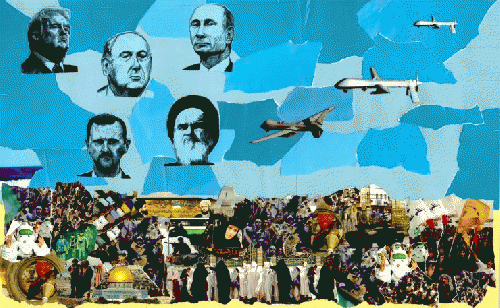This is part 1 of a two-part article
The recent violation of Israel's air space by an Iranian drone and Israel's retaliation against Syrian and Iranian targets prompted many observers to suggest that the growing regional tension resulting from such incidents may precipitate a war between Israel and Iran/Hezbollah, and perhaps inadvertently with Syria as well. I disagree with this prognosis. I maintain that none of the players involved want to engage in a war that will inflict tremendous destruction and casualties without realizing any sustainable long-term gains. This, however, does not preclude an accidental war resulting from an unintended incident or miscalculation.
Regardless of each player's mutual public acrimony and threats, their strategic interests are best served by avoiding war. The question then becomes: what kind of precautionary measures should be taken by all the players involved, especially Russia in cooperation with the US, to prevent such an ominous development?
Iran's overall strategic interest is to become the region's hegemon, and it is determined to realize its objective by first securing a contiguous landmass from the Gulf to the Mediterranean, where Syria is a critical linchpin, and create a united front to threaten Israel. To protect its base and influence in Syria, Iran was quick to exploit the civil war by providing Assad with hundreds of millions of dollars, thousands of well-trained combatants, and military equipment to help him defeat the rebels and ISIS. Having suffered upward of 500 Iranian casualties, Iran became even more determined to reap the fruits of its efforts by pursuing the establishment of a permanent military presence in the country.
Iran's second objective is to maintain a state of constant threat against its staunchest enemy -- Israel -- by seeking to establish a military presence in close proximity to the Israeli borders. Iran uses Israel as a rallying cry to attract violent extremists to support its proxy wars and further its regional agenda. Thus, by keeping up its public assault against Israel, Iran hopes to maintain animosity toward and heighten concerns over the "Israeli menace" against the Muslim world.
In addition, Iran continues to beef up Hezbollah's arsenals in Lebanon; first, because it wants to secure its foothold in Lebanon. Second, because it wants to open up three strategic fronts -- in Syria, Lebanon, and potentially Gaza by way of Hamas -- from which it can intimidate Israel and test its resolve, and create new controlled tensions, as it has recently done by flying a drone over Israeli skies, which was quickly shot down by Israel.
That said, notwithstanding its bravado, Tehran does not want to challenge Israel militarily, knowing that open hostilities now, and even in the foreseeable future, could provoke a massive Israeli retaliation that goes far beyond the reprisal following Iran's incursion into Israeli air space, with the potential to inflict a humiliating defeat.
Finally, Iran wants to preserve the Iran deal and would not want to give Trump reasons to nullify it. That said, even though Trump may still withdraw from the deal, Iran wants to remain in good graces with the other five signatories to the deal to prevent the resumption of the sanctions, especially at a time when the Iranian public is restive and is demanding improved economic conditions and greater social freedoms.
To prevent any miscalculation that could lead to a catastrophic war with Israel, Iran should rather acquiesce and refrain from establishing military bases near the Israeli borders and build them farther north in Syria. In so doing, Iran would also aid in preventing any serious threat to Assad's grip on power, on whose behest Tehran is justifying its continuing presence in the country, which, in any case, assumes top priority in its scheme of regional hegemony.
Tehran will be wise to rein in Hezbollah and prevent it from provoking Israel, since any conflagration between Israel and Hezbollah could destroy much of its infrastructure and rocket stockpile. After all, Iran is more interested in maintaining the threat against Israel from the Lebanese front, which serves its long-term strategic interest by solidifying its foothold in Lebanon only through maintaining a strong Hezbollah.
Hezbollah joined with the Syrian military to combat the rebels throughout the ongoing civil war. Even though much of its fighting force is battle-hardened, Hezbollah is now under increasing pressure to focus on restoring some normalcy to the larger Shiite community in Lebanon, while regrouping in the process. Hezbollah has sustained nearly 1,300 casualties, and Lebanon itself has suffered greatly from Syria's civil war and is still paying a heavy toll in its effort to accommodate over one million Syrian refugees.
Hezbollah, with the full support of Iran, will maintain its threatening posture toward Israel by continuing its efforts to increase its stockpile of weapons, but it will not challenge Israel militarily. Hezbollah knows that Israel's threshold for casualties is very low, and the death of 40-50 Israelis from Hezbollah's rocket fire will provoke overwhelming retaliatory strikes that could inflict thousands of Lebanese casualties, which Hezbollah wants to prevent. In any event, Hezbollah will not initiate any hostilities against Israel without Tehran's approval because such a move ill-serves Iran's strategic regional ambitions.
Under any circumstances, Israel will continue to attack convoys carrying weapons from Iran to Hezbollah, and will also target any weapons manufacturing facilities on Lebanese soil. This, of course, carries certain risks of escalating hostilities. But since Hezbollah and Iran want to avoid a war, they will address such Israeli attacks in the same manner they have addressed previous ones -- by saying little and doing even less. This, however, does not suggest that Israel has a free hand to do what it pleases. Israeli strikes will be measured against the backdrop of the overall environment, which is constrained by Israel's own desire to avoid an open-ended war as long as it is not existentially threatened.
The Assad regime: Since he rose to power in 2000, Syria's President Assad has never contemplated waging a war against Israel. Like his father, he has fully adhered to the 1974 disengagement agreement with Israel. In fact, throughout his reign, Assad has made several peace overtures toward Israel, believing that Syria's future stability and prosperity depends on peace with Israel, or at a minimum maintaining the absence of hostilities.
(Note: You can view every article as one long page if you sign up as an Advocate Member, or higher).






